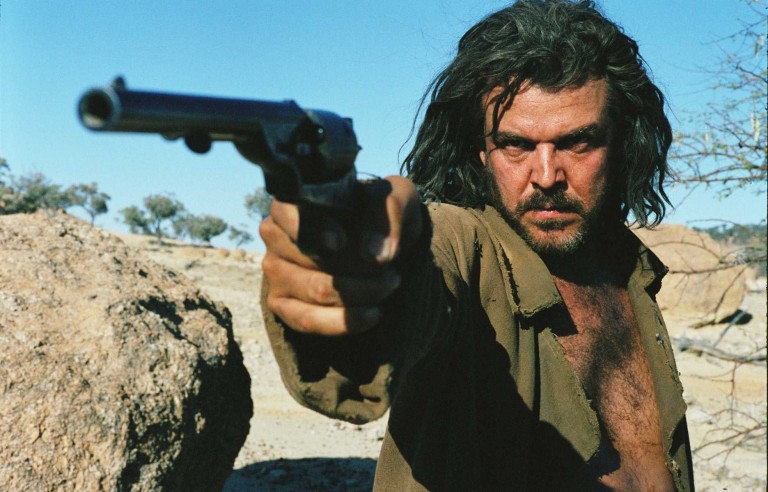The Proposition (2005)

DIRECTOR: John Hillcoat
CAST: Guy Pearce, Ray Winstone, Danny Huston, Emily Watson, David Wenham, John Hurt
REVIEW:
With The Proposition, Australian director John Hillcoat and screenwriter/composer Nick Cave have taken the saying “revenge is a dish best served cold” and taken it up—or down, depending on one’s perspective—a notch. The Proposition is considered an unconventional Western, but it doesn’t deal in clear-cut black hats and white hats or simple shoot-em-ups. Brutal, unromanticized, and mercilessly gritty to the point of being disturbing, it’s a grim, haunting odyssey that doesn’t deal in typical crowd-pleasing Western tropes and conventions, at least not straightforwardly.
Here, the setting is not the American Old West, but late 1800s Australia, where stern lawman Captain Morris Stanley (Ray Winstone) is determined to bring law and order to a lawless land, and to that end he has set his sights on the three Burns brothers, who have recently massacred a family of settlers, including the rape and murder of a pregnant woman. When the film begins, he’s managed to apprehend the runt of the litter, the youngest and least hard-bitten Mike (Richard Wilson), and his older brother Charlie (Guy Pearce), but Public Enemy No. 1 remains elusive: the eldest brother Arthur (Danny Huston), whom he believes to be the ringleader and the most monstrous. Captain Stanley makes Charlie an offer he can’t refuse: with his kid brother’s life hanging over his head, Stanley tasks Charlie with tracking down and killing his other brother Arthur. If Charlie can manage this, Stanley will pardon the remaining Burnses. If he does not, he will hang Mike in nine days, on Christmas Day. Caught between a rock and a hard place, Charlie sets out into the Australian Outback in search of his brother, but the events that follow this set-up are neither predictable nor conventional.

The Proposition is not interested in providing an adrenaline rush or anything “feel good”. It’s a grim, gritty, drama steeped in moral ambiguity that moves at a slow burn with a surprisingly elegaic, meditative tone and populated with characters who are more complicated than they first seem. Charlie is a conflicted man trapped in an impossible position and torn between loyalty to his brothers and his own sliver of a conscience (which he possesses more of than he might seem at first glance). Hollywood tends to typecast Guy Pearce as mustache-twirling villains, but The Proposition gives him the chance to play a more complex character; Charlie might be initially set up as a “bad guy”, but he’s really more of an anti-hero. Likewise, Captain Stanley is initially set up as the kind of merciless hard-ass Ray Winstone has no trouble playing, but is gradually revealed as more sympathetic, a tough guy who’s more interested in law and order than gratuitous cruelty or pacifying a bloodthirsty crowd with scapegoats and is tender toward his wife (Emily Watson), a transplanted Englishwoman almost traumatized by being severely out-of-place in their harsh new environment and by the rape and murder of her friend. Danny Huston’s misanthropic Arthur is on the surface a more straightforward “villain”, but despite his obvious violent and psychotic tendencies, and the heinous crimes he’s responsible for, he is thoughtful, philosophical, a man who can quote poetry or appreciate a sunset, making his occasional bursts of savagery all the more jarring when they come. As Winstone’s wife, Emily Watson (as she also did in a potentially thankless role in Red Dragon), crafts a distinctive character in her own right. John Hurt, looking more leathery than ever, has basically a glorified cameo in a two scene appearance (including a lengthy and somewhat rambling monologue) as a bounty hunter also seeking Arthur Burns. In fact, the most loathsome and most overtly “villainous” character in the movie is neither Pearce, Winstone, nor even Huston, but David Wenham as an officer of the law who is as odiously preening as he is cruel (and we’re denied the comeuppance a more conventional movie would give a character we’re led to detest). Smaller roles include Noah Taylor and familiar Aborigine actor David Gulpilil.
Just as The Proposition is uninterested in simple shoot-em-ups or morally unambiguous white hats versus black hats, it’s equally uninterested in any romanticizing or glamorization. The Australian Outback is an oppressive place that accentuates the film’s uncompromising bleakness, and everyone looks dirty; when we see a crowd gathered to witness a flogging, we see hordes of flies crawling over their clothing. The flogging in question is the most unflinchingly brutal of any this side of The Passion, encapsulated in a moment where the flogger wrings out the blood, to an extent that some viewers might find hard to stomach. Nick Cave, in addition to writing the script, also composes the discordant, unconventional score.
The Proposition is far from a “feel good” movie, and definitely won’t be everyone’s cup of tea—some will find both its brutal violence and its bleakness hard to take—but it does interesting things with its characters, who are steeped in a moral ambiguity that a more Hollywoodized movie rarely dares to show. Characters who would be heroic in more conventional movies have dark sides, and those who would be “villains” have shades of gray. The result is a gritty, unromanticized drama that is as compelling as it is unsettling.
* * *